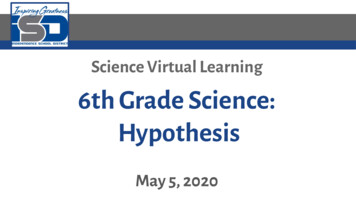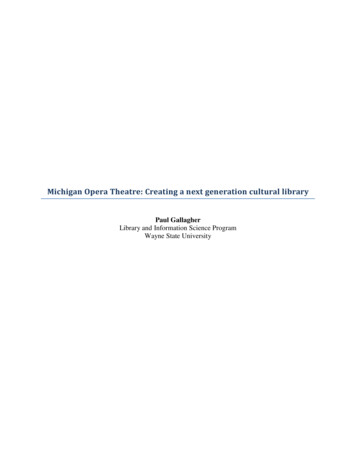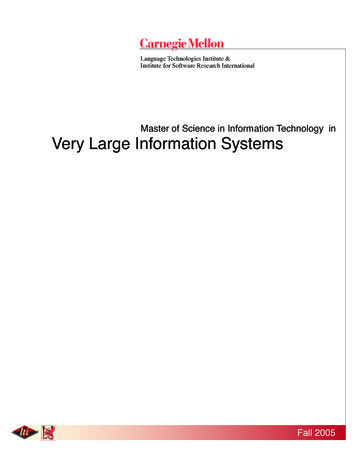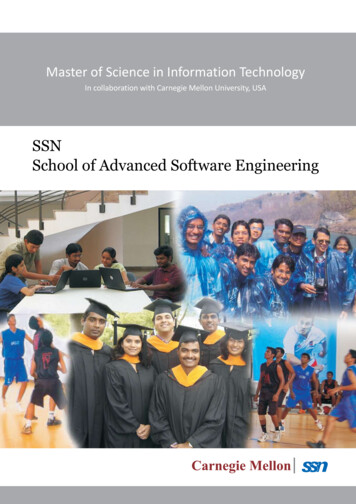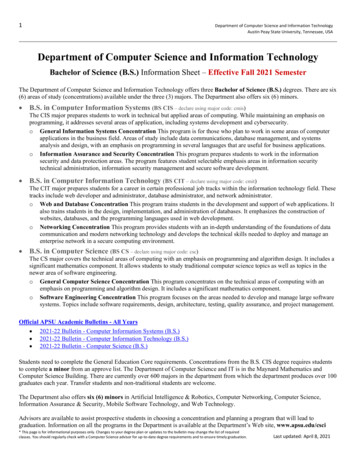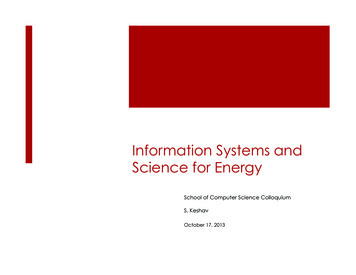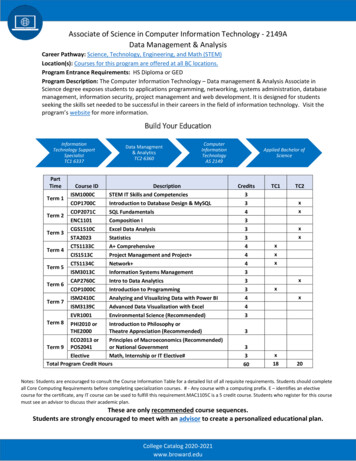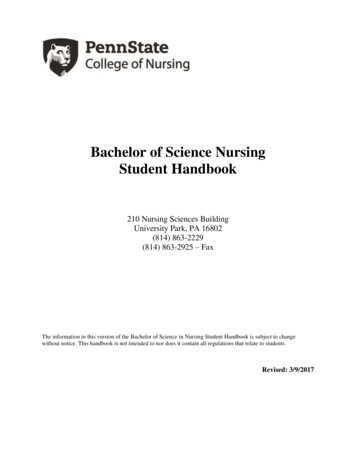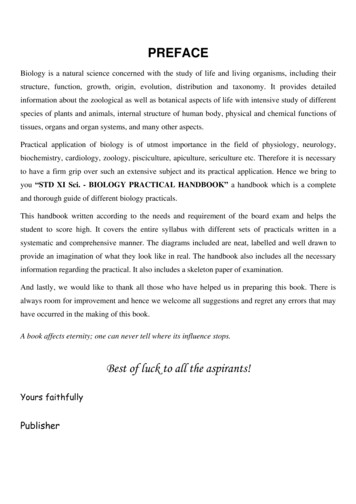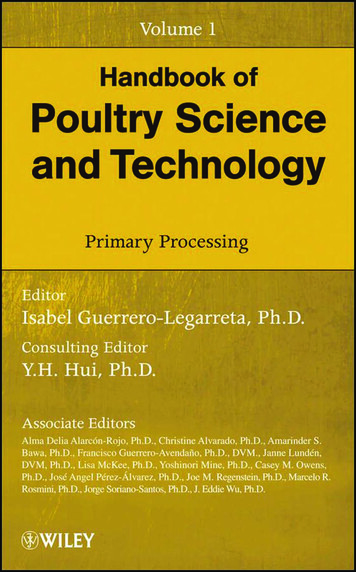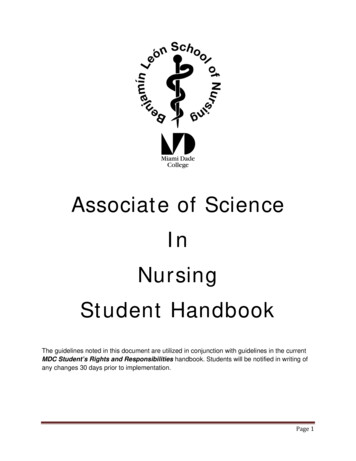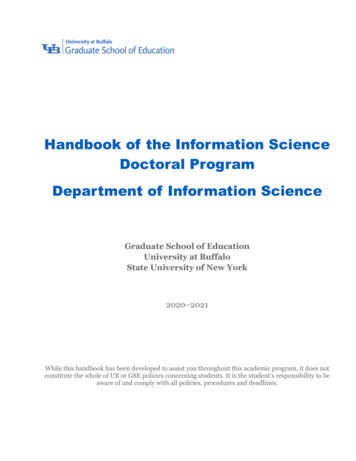
Transcription
Handbook of the Information ScienceDoctoral ProgramDepartment of Information ScienceGraduate School of EducationUniversity at BuffaloState University of New York2020–2021While this handbook has been developed to assist you throughout this academic program, it does notconstitute the whole of UB or GSE policies concerning students. It is the student’s responsibility to beaware of and comply with all policies, procedures and deadlines.
The Doctoral (PhD) DegreeGeneral Introduction and InformationIS has one doctoral program:PhD in Information Science: Our doctoral program in information science is an onlineprogram for students who hold a master’s degree in information science, librarianship,communications, or other cognate disciplines, who seek advanced study in this specialized field.Our asynchronous, online program has an annual residency week on campus. The programincreases access to doctoral level education for those unable to suspend employment to attendan on-campus program.IS PhD Program Academic RegulationsOverviewThese are the current academic policies and regulations of the Department of InformationScience (IS) PhD Program as approved by the IS Faculty. The IS Faculty has charged theAdmissions and Academic Standards Committee with carrying out the academic policies of theDepartment and applying these regulations.Students may appeal any decision related to academic regulations to the Admissions andAcademic Standards Committee. If the initial decision is upheld, the student may then appealto the IS Chair.The student may file further appeals following GSE and ts/policy-library.html) procedures.Planning the Student’s ProgramAdvisementNew students are assigned a faculty advisor by the doctoral program coordinator. Advisors willbe assigned based on student and faculty interests and faculty availability. Dissertationcommittee chairs for students seeking the PhD degree must be members of the Graduate Schoolfaculty.Students will consult with their academic advisors for guidance related to their program ofstudy, course selection, and all other academic matters. If the student's faculty advisor is notavailable, the Chair or Chair’s designee will act as faculty advisor.Students may change their advisor during their program by submitting the Change of Advisorform. Faculty who have served as a student's advisor but believe that they should withdraw fromthe advisory relationship are expected to communicate their reasons to the Chair in a letter withcopies going to the student and the student's file.2
For all non-academic questions, such as fee waivers, financial aid, and housing, students shouldfirst consult with UB 1Capen (https://1capen.buffalo.edu/).Plan of StudyEach student must, in the first semester, develop a Plan of Study with their faculty advisor. Thisplan of study should be guided by the program objectives, the student's own learning objectives,and the anticipated course rotation. In general, the student can register only for courses listedin their most recent plan. Exceptions are made to accommodate contingencies at registration.During a student’s last semester of coursework, they must work with their advisor to completethe Dissertation Checklist and Timeline. The Checklist will replace the Plan of Study as the basisfor evaluation of the annual reviews. The student and advisor should meet regularly to reviewand update the Checklist.Grades and Grade Point Average (GPA)Grade Point Average (GPA) computationOnly letter grades of A,” “A-,” “B ,” “B,” “B-,” “C ,” “C,” “C-,” “D,” and “F” received in UBcourses are considered in computing the GPA.UB policy provides for two GPAs: UB GPA and Overall GPA, which are computed by differentrules. The student's status in the program and eligibility for graduation are determined basedon the PhD GPA. UB GPA. The UB GPA is computed based on the grades in all graduate courses takenat UB. If a student repeats a course one or more times, all grades are used in computingthe UB GPA. Overall (PhD) GPA. The Overall GPA is computed based on: (1) courses taken at UBwhile matriculated in the PhD program and taken with intent to apply the course to thePhD (all IS courses and outside courses included in the student's plan of study at the timeof registration) and, (2) Transferred courses. If a student repeats a course one or moretimes, only the best grade is used in computing the GPA.Letter grades (weighted grades)UB assigns quality points to grades as follows: A (4.0), A- (3.67), B (3.33), B (3.0), B- (2.67),C (2.33), C (2.0), C- (1.67), D (1.0), and F (0.0).3
Satisfactory/UnsatisfactoryGrades of S/U are not included in grade point average but are used to evaluate the student'sacademic progress, with a grade of S considered equivalent to B (3.0) and a U that is directlyassigned by the instructor (as opposed to a U resulting from an I/U) equivalent to F.Incomplete (I/U)An incomplete grade (I/U) will be given upon agreement between the student and instructor.Incomplete (I/U) grades may be given only when the student is unable to complete assignedrequired course work due to illness or other unforeseeable and compelling circumstances butwork the student has completed indicates that the student is on his or her way to a passing grade(at least B(3.0) for a core course and C (2.0) for an elective course). Students must fill out a“Request for Grade of Incomplete” form – a contractual agreement between student andinstructor outlining the conditions and deadlines for removing the incomplete grade. Theinstructor, at his/her sole discretion, may approve the request and defer giving the final gradeor disapprove the request and submit a grade; the student may appeal the grade ts/policy-library.html Grade). An “I/U” is notcalculated into a student's GPA. Students who accumulate 9 or more credit hours of outstandingIncompletes will be placed on academic probation. According to UB policy, if an instructor doesnot change the incomplete grade to a regular letter grade by the agreed-upon deadline, the gradeautomatically becomes a “U” (Unsatisfactory) after one year. A course with a U grade resultingfrom an I/U is treated as if it was never taken.Non-IS Credits Applied to the PhD DegreeAll non-IS courses must be approved by the academic advisor.Transfer CoursesEach incoming student is required to have completed a master degree program in InformationScience or a related field, 30-36 credit hours of which are expected to be transferred towardthe PhD program. The student and the academic advisor shall work together to identifycourses to be transferred. The student needs to fill in Graduate School petition form for (a)any credits over 10 years old at the student’s admission and (b) for all non-UB transfer credits.Transfer of a course is by no means automatic; it must be recommended by the student’s advisorand approved by the Doctoral Program Director and the Graduate School. The possibility oftransfer courses should be discussed between student and advisor by the end of his or her firstsemester. In order to transfer credits, the student must submit to his or her faculty advisor aRequest for Transfer of Credit form f) and official transcript(s). The faculty advisor willforward these documents with a recommendation to the Doctoral Program Director, who willforward them to the Graduate School for a final decision.4
Courses shared with another UB graduate degree (limit 6 credits)Up to six credits earned while matriculated in the PhD program may be shared with other UBdegrees (10% of the sum of the credits needed for both students/policy-library.html– Degree Requirements - General Graduate Degree Requirements). These credits may be anycombination of IS credits applied to the other degree or other degree credits applied to thePhD. Shared courses must be approved by the "receiving" program. The programs involvedwill communicate as needed to make sure that the total of shared credits does not exceed themaximum. Non-IS shared credits taken before matriculating into the PhD program areconsidered transfer credits but non-IS shared credits taken while matriculated in the PhDprogram are not transfer credits.Program RequirementsCredit-hours required for the degreeThe PhD degree requires 72 credits completed with a grade of B or better or with a grade of S.To count towards the degree, a course must have been taken with intent to apply to the PhD (allIS courses and outside courses included in the student's plan of study at the time of registrationas well as transfer courses). Courses with grades other than A, B, or S do not count toward the72 credits. If such courses were taken with intent to apply to the PhD, they are included in thecomputation of the PhD GPA. All such courses are included in the computation of the UB GPA.See Grades and Grades and Grade Point Average, (p. 3) for information on the UB gradingsystem and definition of UB GPA and PhD GPA.Students may transfer 30-36 credits from a master's degree in information science,information studies, librarianship, or a cognate discipline. Transfer of credits from a degreethat is more than 10 years old requires approval from the Graduate School.Grade requirements for graduationA 3.0 or better PhD cumulative Grade Point Average (PhD GPA) is required for graduation (SeeGrades and Grades and Grade Point Average).Course loadDuring the coursework period, students carrying 12 credit hours (9 credit hours for GraduateAssistants) in a semester are considered full-time. A student may take no more than 12 credithours a semester, 8 credit hours in any single 6-week summer session or 12 credit hours in theentire summer. Students working full-time on a doctoral practicum, preparation for a doctoralqualifying exam, doctoral research, or dissertation writing must be registered for at least onecredit to be certified as full-time.5
Seven-year time limitAll coursework within the program must be completed within seven years or 14 semesters fromthe beginning of the student's first semester in the program. A student may petition for anextension of the time limit.Required courses for graduationFor the PhD in Information Science the following core courses are required:LIS 601 Qualitative Methods in Information StudiesLIS 602 Quantitative Methods in Information StudiesLIS 603 Theoretical Foundations of Information StudiesLIS 604 Statistics ILIS 605 Statistics IITo fulfill the PhD requirements, a student must complete all required core courses successfully.Successful completion of a required core course is defined as completion with a grade of B (3.0)or better.Waiver of a required courseIf the student has knowledge and skills that fulfill the objectives of a required course; the coursemay be waived. The student must discuss the possibility of a waiver with their advisor andsubmit a waiver request ver 2014May.pdf)withsupportingdocumentation to the lead faculty for the course soon after admission, no later than two weeksbefore the start of the student's first semester or immediately after admission. An examinationmay be required before a decision is made. The lead faculty will communicate his or herdecision to the student in writing (print or email) with copy to the IS office. The decisiondocument will be placed in the student's file. A course waiver does not imply credit for thecourse (exception being transfer credit courses).Individual Study Courses (Practicum, Directed Study, Thesis)Independent Study (IS 611)An independent study is a 3 credit elective. The course allows exploration of a topic for whichno IS course is available or for the pursuit of research.To register for IS 611, students must find a faculty supervisor. The form to be submitted includesthe title of the directed study and an abstract.6
To register for LS 611 the student must submit the appropriate form dents/forms.html) to the IS office with allapplicable signatures.Qualification and DissertationQualifying Requirements:The student will assemble a committee conforming to UB graduate guidelines in place withthe additional requirements listed below and then decide on a research topic and produce adissertation prospectus (short research proposal) on a specific topic of specialization. This willserve as a pre-proposal for the dissertation. This requirement must usually be met no laterthan the end of the fourth semester in the program for full-time students and no later than theend of the ninth semester for part-time students. Students will earn 3 credits for producingthe short research proposal.Qualification Process:1. Complete all core (required) courses in the program.2. Decide on a research topic in consultation with advisor.3. Produce a short research proposal (dissertation prospectus) that articulates theresearch questions to be pursued in the dissertation, includes a short literature review,outlines one or more possible theoretical frameworks that will inform the research, andsummarizes the methods expected to be applied. This research proposal is expected tobe approximately 20 pages in length.4. Select advisor and dissertation Committee. The Committee composition must beapproved by the Director of the PhD program. The Committee may include up to oneexternal member.5. Pass an oral examination on background knowledge required to conduct the researchoutlined in the research proposal. The Committee will provide a written list of topics tobe covered in the examination. This requirement must usually be met no later than theend of the fourth semester in the program (for full-time students) and the ninthsemester for part-time students. The PhD program Director may grant an additionalyear. The examination may be retaken once within 12 months. Upon successfulcompletion of the oral examination, the student may file for candidacy.DissertationIn 12-18 dissertation credits, the final dissertation proposal must be produced and approvedby the Committee, the dissertation data must be collected and analyzed, and the dissertationmust be produced.The final proposal will be a refinement and expansion of the dissertation prospectus, and willinclude a fully articulated set of research questions, literature review, theoretical frameworks,and detailed methods section. This final dissertation proposal must be completed by the end7
of the sixth semester in the program (for full time students) and the eleventh semester (forpart time students).When complete, the candidate will defend the full publication–ready dissertation at a publicdefense that will include an oral examination by the PhD Committee. The public defense willbe held online via video conference; it may also be held in a hybrid mode (with some attendeesonline and some in person) at the agreement of the Committee and the candidate.The dissertation will be an original contribution to the field of Information Science asdetermined by the PhD candidate’s dissertation committee. In addition to ensuring theoriginality of the work, the dissertation committee will ensure that the cannons oforganization, presentation, and documentation usually prescribed for publications in the fieldof Information Studies are followed. Likewise, the candidate and the committee will certifythat the dissertation is substantially free of errors and ready for publication upon submissionto the Graduate School.Course WorkTime on taskAs a general rule, time on task per credit hour, including class time and out-of-class readingsand assignments, is 3-4 hours per week for 15 weeks, or 45-60 hours total. For a 3-credit coursethis means 9-12 hours per week, so a course load of 4 courses per semester corresponds to ademanding full-time job.Repeating coursesA student may repeat a course only once (for a total of two attempts). A student may want torepeat a course in order to remove a grade below B (3.0) in a core course, a grade ofUnsatisfactory, or to improve their record. All course registrations will appear on the student'stranscript. The best grade in each course will be used for computing the MS GPA; all gradeswill be used for the UB GPA.Required core courses: Course resignationsStudents may resign from required courses only once. Upon resignation, the student will beplaced on academic probation and the course must be taken in the next available semester ofregistration.Student Status in the ProgramGood academic standingA student is in good academic standing if he or she: maintains a PhD GPA 3.0 or above (see Grades and Grade Point Average (GPA)8
has a grade of B (3.0) or better in each required core course taken has fewer than 9 credits of incomplete grades ml)(http://www.buffalo.edu/studentlife/life-on-A student in Good Academic Standing is eligible to register for courses unless there areproblems with outstanding bills or other UB administrative requirements.Note: A failing grade in an elective course does not make the student lose Good AcademicStanding as long as the student's UB GPA remains 3.0 or above.Annual ReviewEach student’s academic progress will be evaluated annually by the Director of the PhDprogram, and, if appropriate, the student’s dissertation advisor. This annual review will occur bymid-May, thereby permitting appropriate academic planning for the following semester, andallowing for timely responses to inquiries about students in jeopardy of losing federal and/orstate financial aid.Additionally, each PhD student’s academic progress will be reviewed after their first semester ofenrollment, in order to identify any academic problems early in the program. The Director ofthe PhD program will be required to communicate the academic evaluation to the student inwriting.These elements will be included in the Department’s annual evaluations:1. Review of the student’s academic record, including:- checking the overall GPA- addressing any incomplete and/or resigned courses- monitoring overall progress toward completing the coursework phase of the program2. Checking on progress in completing or preparing for the preliminary or qualifyingexam(s) or paper(s).3. Planning a timely defense of the dissertation research proposal or prospectus.4. Monitoring adequate progress in research, including timeliness of degree completion.If the student is not making adequate academic progres, his or her entire record will be reviewedby the Admissions and Academic Standards Committee. The Committee will recommend to theIS Chair one of two actions:1. Place the student on academic probation.2. Dismiss the student from the programStudents on academic probation will be reviewed at the end of each semester. At the time ofreview, if a student meets all conditions of Good Academic Standing, the academic probation9
will be lifted. Otherwise, the academic probation will remain. Students who repeatedly fail tomeet the conditions of good academic standing may be dismissed from the PhD program.Continuous registration requirementGraduate students must register (and pay all tuition and fees not covered by a tuitionscholarship) for a minimum of one credit hour each fall and spring term until all requirementsfor the degree are completed. If continuous registration is impossible or inappropriate at anytime, students must secure a leave of absence from the department in which they are enrolledand obtain approval from the GSE Graduate Degrees Committee. Students may not be on aleave of absence during the semester in which a degree will be conferred.Leave of absenceStudents unable to enroll in any fall or spring semester must submit a Graduate Student PetitionForm (https://registr
Doctoral Program . Department of Information Science . Graduate School of Education . University at Buffalo . State University of New York. 2020–2021 . While this handbook has been developed to assist you throughout this academic program, it does not constitute the whole of UB or GSE policies concerning students. It is the student’s .
